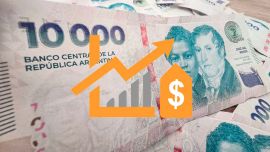How long will he last? First, he suffered a last second modification to the 2021 budget which increased the fiscal deficit substantially. Then, he was forced to swallow a sudden change to the formula used to calculate retiree and pension payments, further increasing pressure on already strained government coffers, orchestrated by none other than Senate President Cristina Fernández de Kirchner.
This week, Economy Minister Martín Guzmán watched along as already announced increase to utility bills expected for January—a pre-requisite to lowering the dependency on state subsidies—was pushed back at least until March.
All of these measures are contrary to Guzmán’s own plan which was based on a prolonged period of moderate fiscal consolidation that put the economy on a path to sustainability. And they help delay an agreement with Argentina’s largest creditor, the International Monetary Fund, which the minister knows is essential to give the country breathing room in order to “get back on its feet,” as President Alberto Fernández likes to say.
Underlying all these actions lays the internal and external balance of power of this coalition government, with Alberto looking increasingly weak as he’s pulled from side to side, trying to keep everyone content in the midst of a calamitous economic implosion and a global pandemic that is beginning to get ugly again across the globe. To make matters worse, President Alberto promised to begin vaccinating the population this year, but Health Minister Ginés González García has been locked in a war of words with Pfizer, while the hotly anticipated Russian vaccine Sputnik V is yet to be safe for the main risk group, patients over 60, as Vladimir Putin informed the world this week. Guzmán’s budget projects an economic expansion of 5 percent in 2021, which is expected to be higher, if and only if inoculation allows the liberation of the animal spirits.
Guzmán had to fight for his right to hold the economic reins of the country. A few months ago, when hardened currency controls known as the “super cepo” proved inept at containing the value of the black market exchange rate or the “dólar blue,” the minister was handed the keys to the “economic cabinet," anointing him a primus inter pares with authority even over the supposedly autarkic Central Bank and its president, Miguel Ángel Pesce. It was Guzmán’s second victory after having managed to complete the restructuring with private creditors. He managed to contain the black market rate, putting downward pressure on the multiple dollar exchange rates, and even allowing the Central Bank to buy back reserves. While it may have come with a heavy price—increased indebtedness in peso instruments tied to inflation or the US dollar—it came as a third victory for the former Columbia University academic.
Yet, his successive successes over colleagues that respond to President Alberto seem insufficient in the face of political decisions coming from the Instituto Patria, the Kirchnerite think tank. The series of reversals to Guzmán’s 2021 policies mentioned at the beginning of this column send a clear message: austerity will not be tolerated, much less so in an electoral year. It also indicates a clear ideological inclination close to Mrs. Fernández de Kirchner to rely on state interventions to control the major macroeconomic variables.
This is something Cristina already tried during her second mandate, when the economic hangover from the global financial crisis caused an end to the commodities supercycle and eroded Argentina’s dual surpluses. Cristina put current Buenos Aires Province Governor, Axel Kicillof— a self declared Marxist—,in charge of the Economy Ministry and the combative Guillermo Moreno as Commerce Secretary in order to supervise a controlled economy. The result was devastating, leaving Mauricio Macri a situation of stagflation, deep deficits, and default. In the end, Macri detonated the ticking time bomb, leaving behind scorched earth and desolation.
Guzmán’s appearance in Alberto’s cabinet brought an absolute outsider to play a major role at a critical moment. Criticised for being too young and an academic, he brought with him sound ideological baggage, denouncing the IMF’s austerity plans but prescribing a fairly orthodox antidote based on reducing fiscal deficits after a certain level of debt forgiveness. He battled the BlackRocks and Fidelitys of the world and won the good grace of a certain CFK. Alberto gave him control of economic policymaking and Cristina would hold meetings with him and praise him publicly.
Yet, what good is this type of an Economy Minister if he can’t execute on his decisions? Among the major problems with the Argentine economy is its network of subsidies that keep public services cheap. In the 2021 budget, Guzmán projected that energy subsidies would remain steady around 1.7 percent of GDP, some $624 billion. During Cristina’s second term subsidised energy bills caught the government in a vicious cycle, unable to hike prices for political reasons but forced to spend a rising number of dollars to, literally, keep the lights on. Macri tried to unravel this, raising the cost of energy wildly, to the detriment of his reelection. While Energy Secretary Darío Martínez said they wouldn’t keep the cost of energy artificially low, promising to raise prices in line with inflation, a presidential decree extended a price freeze at least to March, transferring the authority to engage in price negotiations outside of Guzmán’s reach. The decision is attributed to the Kircnherite portion of the ruling coalition, Frente de Todos.
It’s not the only direct intervention in the economy, and certainly won’t be the last. There can be no doubts IMF managing director Krystalina Georgieva took notice of one more policy decision that will increase next year’s fiscal deficit above Guzmán’s initial projections. Is it possible to win next year’s midterm elections while executing a plan of fiscal tightening? Can Argentina find macroeconomic balance if it doesn’t tackle its deficit? Will Cristina allow Alberto to sanction Guzmán’s fairly orthodox plans? The former protégé of Nobel laureate Joseph Stiglitz—one of Mrs. Fernández de Kirchner’s favourite economists—is said to have threatened with resigning in the past if he wasn’t given the power to determine economic policy. In public, he’s said his plan is to stay and put the nation on a path of economic sustainability. It’s just not clear how he’ll do that if he’s not in calling the shots.























Comments